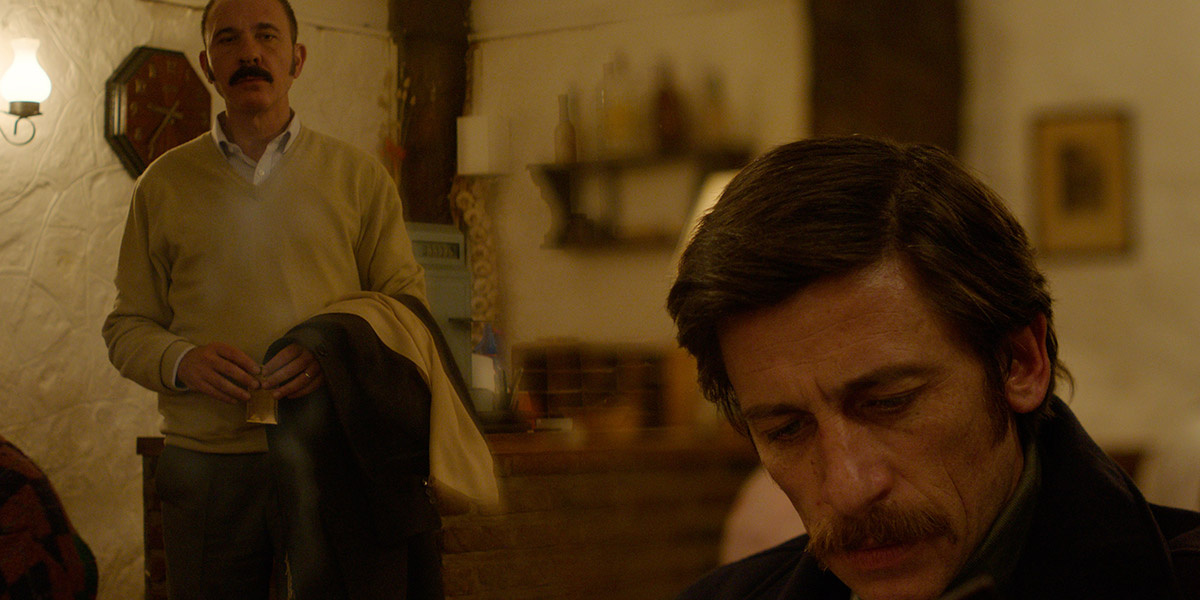San Sebastian Film Review: ‘Rojo’
By Jessica Kiang
LOS ANGELES (Variety.com) – The past is a hurriedly abandoned house, ripe for the looting, in Benjamin Naishtat’s superbly sinister and stylish “Rojo.” And so it begins with one: A mid-sized, detached 1970s home, its windows shuttered like the closed eyes of a coma patient. A portly, well-dressed man emerges carrying an ornamental clock — this scoreless scene, set to chilly early-morning birdsong, is already tinged with absurdity — before a girl scurries off with an armful of clothes, an older lady totters out under the weight of a gilt mirror and some men maneuver a TV through the doorway. They are not residents, nor neighbors attending a yard sale; they are scavengers, implicitly turning some unseen family’s misfortune to their own end. This is regional Argentina in 1975, and while the coup d’état won’t happen for months, the unease of it is already an airborne disease carried backward on the wind. Argentina’s middle-classes are battening down the hatches of self-interest against the storm to come.
With an abrupt cut, typical of Andrés Quaranta’s bold, smash-cut editing style, we’re in a noisy restaurant where well-known lawyer Claudio (“Wild Tales” star Dario Grandinetti, his baldness accentuated by the luxuriance of his mustache), sits alone at a table waiting for his wife. A twitchy stranger (Diego Cremonesi) materializes at his elbow and starts to loudly harangue him for taking up space in a full restaurant when others are ready to order. Under the barrage, Claudio unexpectedly relents, and gives the man the table.
But the loss of face is insupportable and so the harangued Claudio becomes the haranguer, not stopping until the unstable stranger, broken and weeping in the contested seat, dives for the exit ranting madly about Nazis. Claudio and his wife Susana (Andrea Frigerio, a picture of high-maintenance complacency) will, however, meet him again on their way home, an encounter that culminates in a trip to the darkened desert where dead bodies sprout like night-blooming flowers.
There are so many things going on in this prologue, before the title has even appeared: The stranger is a character zinging with menace, but he’s also an allegory for the ruling classes’ idea of an obnoxious proletariat demanding a literal seat at the table. This critique of bourgeois hypocrisy is reminiscent of Lucrecia Martel’s “The Headless Woman,” but “Rojo” is also a Ruben Östlund-esque satire on masculine social behavior: Claudio’s demeanor as he humiliates the man is that of a wolf with the scent of blood in his nostrils. It’s also a work of mordant paranoia in the vein of Pablo Larraín — an impression enhanced when Larraín regular Alfredo Castro shows up as a hilariously creepy “celebrity detective” from Chile, where the coup has already happened.
The shooting style is something else again. We get Peckinpah-esque slow-motion, Pakula-style split diopters, the grainy, uncheerful grade of “The American Friend” and lurid crash zooms that seem lifted from “Let’s Scare Jessica To Death” and other 1970s schlock, which also influences Vincent van Warmerdam’s excellent, foreboding score. But it’s drained of campiness by the effortless control of d.p. Pedro Sotero (a regular collaborator with Kleber Mendonça Filho). A costume and production design palette of yeasty yellows and olive greens accents the splashes of titular red: dull pinkish hues, deep burgundies and a nightmarish blood-red filter used to evoke the uncanny light of a solar eclipse.
Naishtat’s deft screenplay is more ambitious even than that high-concept beginning, weaving in rodeos and magic shows, beach trips and tennis matches, gallery openings and game nights. Subplots abound: Claudio’s friend Vivas (Claudio Martínez Bel) is putting together a shady real estate deal; a troupe of American cowboys become pawns in a political chess game; and Claudio’s daughter Paula (Laura Grandinetti, Dario’s real-life daughter) is jealously eyed by her boyfriend Santiago (Rafael Federman), the personification of the next generation of well-off, entitled Argentinian manhood. And that’s before the sanctimonious Detective Sinclair (Castro) shows up to investigate the disappearance of Vivas’ brother-in-law. Indeed, the bassline of twanging unease here is disappearance, and how everyone who vanishes — the house’s occupants; the stranger in the restaurant; the boy Santiago talks to about Paula — does so somehow to the advantage of the privileged class.
Eclipses only last a few seconds, and the disappearing-woman magic trick ends with reappearance. But in reality, in moments of erasure we lose things that we never get back. Full of unexpected formal flourishes and darkly witty dilemmas, this third film marks a magnificent step up from Naishtat’s already promising “History of Fear” and “The Movement.” “Rojo” is a witheringly provocative examination of temporary moral eclipse becoming permanent moral apocalypse, in a vortex of social upheaval in which respectable men are corrupted, innocent men are persecuted and a hairless man, whose baldness is perhaps the last honest thing about him, finally dons a wig.

